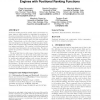Free Online Productivity Tools
i2Speak
i2Symbol
i2OCR
iTex2Img
iWeb2Print
iWeb2Shot
i2Type
iPdf2Split
iPdf2Merge
i2Bopomofo
i2Arabic
i2Style
i2Image
i2PDF
iLatex2Rtf
Sci2ools
SIGIR
2012
ACM
2012
ACM
To index or not to index: time-space trade-offs in search engines with positional ranking functions
Positional ranking functions, widely used in web search engines, improve result quality by exploiting the positions of the query terms within documents. However, it is well known that positional indexes demand large amounts of extra space, typically about three times the space of a basic nonpositional index. Textual data, on the other hand, is needed to produce text snippets. In this paper, we study time-space tradeoffs for search engines with positional ranking functions and text snippet generation. We consider both index-based and non-index based alternatives for positional data. We aim to answer the question of whether one should index positional data or not. We show that there is a wide range of practical time-space trade-offs. Moreover, we show that both position and textual data can be stored using about 71% of the space used by traditional positional indexes, with a minor increase in query time. This yields considerable space savings and outperforms, both in space and time, r...
Information Storage And Retrieval | Information Technology | SIGIR 2012 | Text Snippets | Web Search Engines |
| Added | 28 Sep 2012 |
| Updated | 28 Sep 2012 |
| Type | Journal |
| Year | 2012 |
| Where | SIGIR |
| Authors | Diego Arroyuelo, Senén González, Mauricio Marín, Mauricio Oyarzún, Torsten Suel |
Comments (0)

